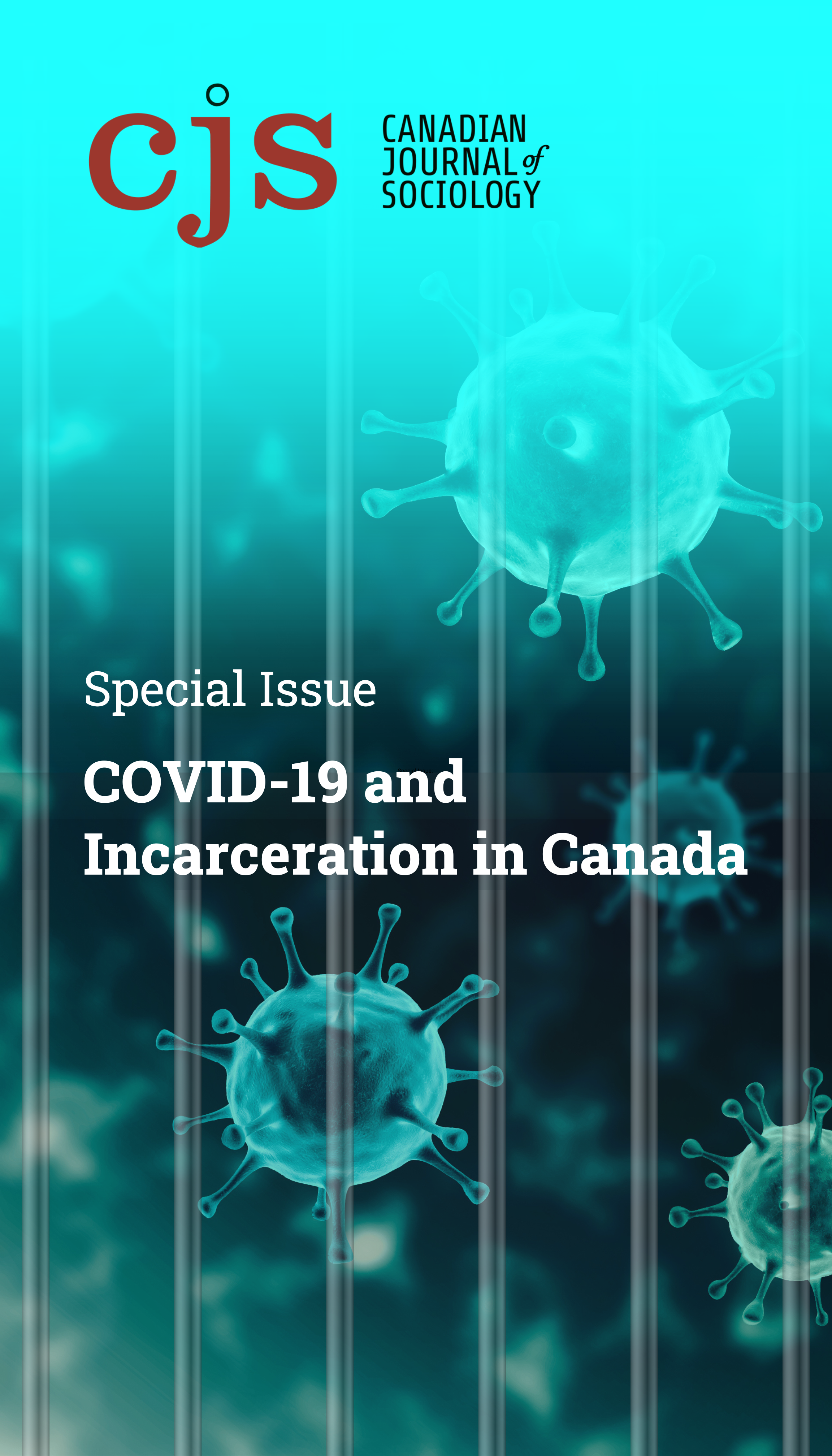Surviving the Pandemic on the Inside: From Crisis Governance to Caring Communities
DOI:
https://doi.org/10.29173/cjs29890Abstract
The COVID-19 global pandemic spurred unprecedented global lock downs and quarantines. In looking at the response to and the impacts of COVID-19 in Canadian prisons, we show how the global pandemic can illuminate the impacts of imprisonment to make them more tangible and relatable to the wider public who are largely disconnected from the prison experience. We begin this article by conceptualizing how ‘crisis governance’ produces new practices of penal operations that become problematically normalized, even after the crisis fades. This is reflected in the Correctional Service of Canada’s (CSC) “new normal” document, a strategic plan and management protocol introduced by federal corrections in response to the pandemic. To highlight the new penal regime, we focus our analytical efforts on the mental health impacts of the CSC’s COVID-19 new governance and response plan as they have been reported by way of lived experiences of federal incarceration in Canada throughout the pandemic. We argue that in their efforts to securitize the environment in light of the very real health risks that COVID-19 presents, the actions taken and not taken by prison officials and Canadian politicians primarily left prisoners isolated, disconnected, and without supportive resources, which aggravates underlying mental health conditions and creates additional emotional distress for vulnerable people. Not only can this approach detrimentally impact staff-prisoner relations, it also fails to consider the value of decarceration as an essential and possibly life-saving component of the correctional COVID-19 risk management response plan. We conclude by considering more humane recommendations that would instead prioritize the creation of “caring communities” where collectives of people support each other’s health and well-being, over punitive and austere management practices. Given that the detrimental effects of isolation are now also being felt to a certain extent by those who are not incarcerated, this penal move to a “new normal” should signal to the wider public the ongoing and exceptionally damaging implications of imprisonment.
Downloads
Published
Issue
Section
License
Copyright (c) 2022 Rachel Fayter, Brittany Mario, Vicki Chartrand, Jennifer M. Kilty

This work is licensed under a Creative Commons Attribution-NoDerivatives 4.0 International License.
1. The CJS will perform the usual functions of copy-editing on the article. The Author(s) will be given an opportunity to read and correct proofs, but if they fail to return them by the date set on the proofs, production and publication may proceed without the Author(s)'s approval of proofs.
2. The CJS will publish this article pursuant to this contract at its cost. CJS has the exclusive right to determine how the article will appear in the journal and elsewhere.
3. The Author(s) warrant that permission to publish the article has not been previously assigned elsewhere. The Author(s) further warrant that the contribution is original to them, except for any copyrighted material of others incorporated in it, and that the Author(s) will advise us of any material, either text or illustration, the rights for which are controlled by others. Where necessary, the Author(s) will obtain, before publication and at their expense, permission in writing from the owner of the copyright in that material for publication by us. Copies of any such permission must be submitted to CJS for our files.
4. The Author(s) further warrant that the article contains no defamatory or otherwise unlawful matter and that it makes no improper invasion of the privacy or personal rights of anyone. The Author(s) undertake that all statements in it purporting to be facts are true; and that they will advise us of any statements that might be construed as defamatory or otherwise unlawful. We may require substantive revision of the manuscript to avoid including material that may infringe rights or be defamatory or otherwise unlawful. 5. In the unlikely event of any claim, action, or proceeding based on an alleged violation of any of these warranties, we shall have the right to defend the same through counsel of our own choosing. The Author(s) agree to pay all resulting costs and damages, except that this indemnity shall not apply to any changes in the manuscript by us that were not approved by the Author(s) in advance of publication, or to any material that the Authors had warned us in advance of publication might be construed as defamatory or otherwise unlawful.
6. In order to protect both Author(s) and CJS from unauthorized use of the article, the Author(s) agree to refer to us any subsequent requests to publish it or a substantial portion thereof. If we choose to grant any such request, we will normally exact a standard fee for reprinting, the amount of this fee to be fixed by us from time to time; this fee will be divided equally with Author(s). We will accede to any request by the Author(s) to use part or all of their article in a article published under either Author(s)’s exclusive authorship or editorship, provided that acknowledgment of its first appearance is made in a manner approved by CJS, and in such cases no fee for reprinting shall be payable to us.
7. Subject to the above conditions, and in consideration of CJS undertaking to subsidize costs of publication of the article, the Author(s) assign to CJS the exclusive world rights to the article in its present, or substantially its present, form, and the parties hereto agree upon the foregoing terms for themselves and their respective executors, administrators, assigns, or successors. The Author(s) herby waive any claim for royalties and reprint fees arising from the use of their article. CJS hereby obtains the right to use the article in any future publication, including, but not limited to, publication in electronic media, issued under its auspices and to authorize others, including reproduction rights organizations such as CanCopy, to do the same.


 Canadian Journal of Sociology | ISSN 1710-1123
Canadian Journal of Sociology | ISSN 1710-1123